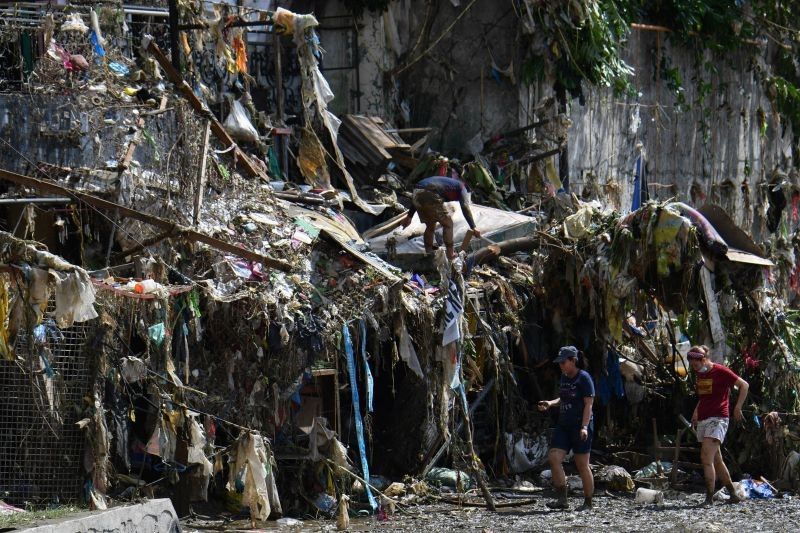What does UN climate report mean for Philippines? Expert says stronger cyclones, faster sea level rise

MANILA, Philippines — Human-induced climate change is intensifying cyclones that threaten many countries in the world, including the Philippines, and will make storms worse in the coming decades, a climate scientist said Wednesday.
In a sobering report released Monday, the Intergovernmental Panel on Climate Change confirmed that “widespread and rapid” changes in the atmosphere, ocean and land have occurred and that it is “unequivocal” that human activities have warmed the planet.
The IPCC—a panel of climate scientists convened by the United Nations—warned that some of the consequences of the climate crisis, especially changes in the ocean and ice sheets, are irreversible for centuries to millennia.
And what do the findings of the report mean for the Philippines—an archipelago in the Pacific that is highly vulnerable to the impacts of climate change?
“It means the impacts we’re already seeing now—for example, impacts of tropical cyclone occurrences all over the country—they’re going to get worse. The projection is that while the number of tropical cyclones may not increase, its intensity will definitely increase,” climatologist Lourdes Tibig said in an interview with ABS-CBN News Channel.
“We’re going to see more adverse impacts, we’re going to experience more extreme temperatures, we’re going to experience more heavy rainfall and flooding events. What does it mean for our economy? It is a lot,” she added.
IPCC warned that the average global temperature will likely breach the 1.5-degree Celsius warming threshold within the next 20 years, bringing more extreme weather events. Human activities have already heated the Earth by 1.1°C.
Continued sea level rise driven by climate change will affect coastal communities in the country, Tibig also said, warning that some islands may be submerged underwater if the rise in sea levels is not decelerated.
“Sea level rise in the Philippine seas is faster than what the IPCC report says,” she said.
At least three meters of sea level rise can be avoided if humans limit warming to 1.5°C instead of 2°C, according to the report.
Swift action needed
Tibig, who also serves as Institute for Climate and Sustainable Cities’ climate advisor and a member of the Climate Change Commission’s National Panel of Technical Experts, said people will see more adverse impacts on the country’s environment, agriculture, food security and the health sector “if we do not heed the new report.”
She emphasized that the report sends the message that governments must take critical action to cap warming to 1.5°C—the goal set by the 2015 Paris Agreement.
“It simply means that we need to act fast now and we need to have massive action in order to reduce our emissions,” Tibig said.
“We need to step up our actions, we need to be consciously aware of what’s going to happen if you don’t try to do something.”
Follow this page for updates about climate change and information on current environmental issues. Main photo by Efigenio Toledo IV
Britain's Conservative government announces new plans to "support drivers" and push back on "anti-car measures" as some opposition-led areas move to impose restrictions on the use of motor vehicles in the name of environmental protection.
"The clamp down on drivers is an attack on the day to day lives of most people across the UK who rely on cars to get to work or see their families," Prime Minister Rishi Sunak says in a statement announcing the new plans.
"This week the UK government will set out a long-term plan to back drivers, slamming the brakes on anti-car measures across England. We are taking the necessary decision to back the motorists who keep our country moving." — AFP
Researchers say marine heatwaves may last longer and be more intense in deeper water, potentially threatening sensitive species as climate change makes the extreme events more frequent.
Oceans have absorbed 90% of the excess heat produced by the carbon pollution from human activity since the dawn of the industrial age.
Marine heatwaves -- episodes of abnormally high water temperatures -- have become more frequent and intense. — AFP
The government says Hong Kong experienced its hottest summer on record this year, with the city seeing "record-breaking" temperatures.
"Together with the exceptionally hot weather in June and July, Hong Kong experienced the hottest summer on record from June to August 2023," it says in a press release. — AFP
The weather agency says Japan's summer this year was the country's hottest since records began in 1898.
"In the summer (June-August) of 2023, the average summer temperature in Japan was considerably higher in northern, eastern, and western Japan. Average temperatures in Japan are the highest for summer since 1898," the agency says.
"The average temperature anomaly in Japan, based on observations at 15 locations, was +1.76 degrees C, far exceeding that of 2010 (+1.08 degrees C), which was the highest since statistics began in 1898 and the highest for summer," it says in a statement.
"Warm air tended to cover northern Japan and warm air flowed in from the south, resulting in considerably higher average summer temperatures in northern, eastern, and western Japan," it adds. — AFP
European climate service Copernicus announces Tuesday that July 2023 easily broke the record for the hottest month ever recorded on Earth, beating the previous record which was July 2019 by 0.33 degrees Celsius.
Marred by heatwaves and wildfires around the globe, last month also saw average air temperatures 0.72 degrees hotter than recent July averages from 1991 - 2020. — AFP
- Latest
- Trending
































